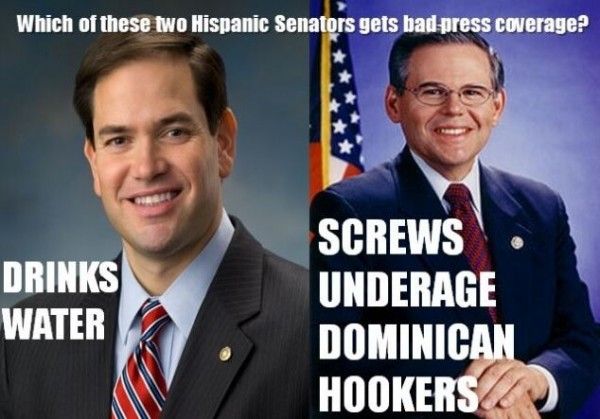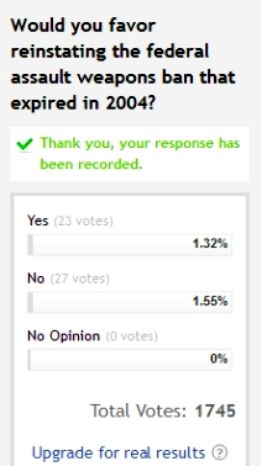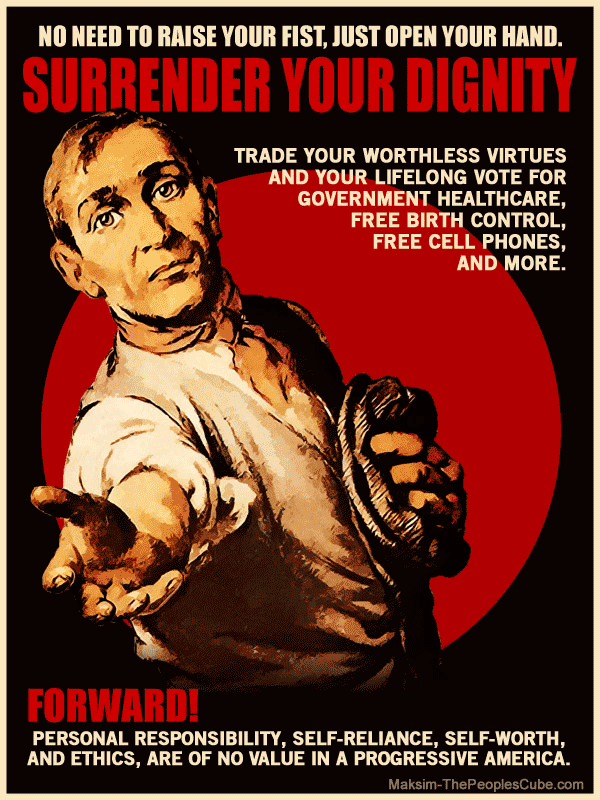Takes on a whole new interpretation, doesn’t it?

Via Instapundit.
The Smallest Minority on earth is the individual. Those who deny individual rights cannot claim to be defenders of minorities. – Ayn Rand
Because this is my blog, and I can:
I can’t get excited by the question of whether Senator Robert Menendez had sex with a prostitute in Central America. It is her word against his — and when it comes to a prostitute’s word against a politician’s word, that is too close to call. — Thomas Sowell – Random Thoughts
I don’t know how I missed this one when it was first posted in April of last year. Andrew Klavan and Bill Whittle skewer Obama’s The Road We’ve Traveled:
[youtube https://www.youtube.com/watch?v=2aR1ekUSfyU?rel=0]
So Florida Senator Bill Nelson has posted a survey on his .gov homepage asking “Would you favor reinstating the federal assault weapons ban that expired in 2004?” Of course I had to register my vote. But when the results popped up, I was certain I was at a .gov website:

If you can’t read that, it says 23 votes “Yes,” 27 votes “No,” total votes 1745.
So apparently no one on the Senator’s staff can find a real online poll service? Or is this just to prevent the Senator’s embarrassment when the actual results come back 3:1 against reinstating the ban?
Yeah, your .gov at work for sure.
—
UPDATE: Somebody finally got it working. At this time, 4,398 votes – 4319 “No,” 67 “Yes,” and 12 “No Opinion.” Oh, and that’s 64.5:1
Found here:
Let’s look at what we have learned from this election: Twenty-one of 22 incumbent senators were re-elected, and 353 of 373 incumbent members of the House were re-elected. The American people have re-elected 94 percent of the incumbents who were running for re-election to an institution that has an approval rating of about 9 percent. This indicates, as an electorate, we are a nation of idiots.
100+ years of Publik Edumacashun FTMFW!
Former Blogger Jed Baer sent me an email New Year’s Eve with a link to a recent speech given by George F. Will at St. Louis’ Washington University for their John C. Danforth Center on Religion and Politics. I respect Mr. Will quite a bit, having quoted him numerous times on this blog including the entire text of his keynote speech at the Cato Institute’s biennial Milton Friedman Prize dinner from May of 2010. I won’t do that again, even though I have much better PDF version of this speech from which to work than I had of the previous one. No, this time I’ll just embed the video.
Mr. Will explains that he is “secular,” by which I assume he means small-“a” atheist or agnostic, but his defense of religion in America had me nodding along throughout the speech. If you’re interested in this topic, I highly recommend the speech and Q&A that follows:
[youtube https://www.youtube.com/watch?v=TbA5ab18SCo?rel=0]
I will excerpt a short bit, though, to whet your appetite:
When people today speak of nature, they generally speak of flora and fauna, of trees and animals and other things not human. But the Founders spoke of nature as a guide to and and a measure of human action. They thought of nature not as something merely to be manipulated for human convenience, but rather as a source of norms to be discovered. They understood that natural rights could not be asserted, celebrated and defended unless nature, including human nature, is regarded as a normative rather than a merely contingent fact.
This was a view buttressed by the teaching of biblical religion, that nature is not chaos, but rather it is the replacement of chaos reflecting the mind and will of the Creator. This is the creator who endows us with natural rights, that are inevitable, inalienable, and universal, and hence the foundation of democratic equality. And these natural rights are the foundation of limited government, government defined by the limited goal of securing those rights so that individuals may flourish in the free and responsible exercise of those rights.
A government thus limited is not in the business of imposing its opinions about what happiness or what excellence the citizens should choose to pursue. Having such opinions is the business of other institutions, private and voluntary institutions, especially religious ones that supply the conditions of liberty. Thus the Founders did not consider natural rights reasonable because religion affirmed them, rather the Founders considered religion reasonable because it secured natural rights.
There may, however, be a cultural contradiction in modernity. The contradiction is that while religion can sustain liberty, liberty does not necessarily sustain religion. This is of paramount importance because the seminal importance of the Declaration of Independence.
And he goes on to explain why.
Worth your ninety minutes.
From The People’s Cube:

Rachel starts the year off right with the title to her post, which I made QotD:
Thank God our heroic president spent more than three million dollars of our money to heroically help our heroic Congress heroically do exactly shit-all.
After the title, she really gets going.
Read it all, and all the links. Quoting Rachel again:
When I encounter people in conversation who acknowledge the set of facts about what’s happening in the Western world right now and then say, “Meh, bah, blah blah, there’s nothing I can do about it, I’m just going to enjoy my life,” I literally – I do mean literally – almost burst into tears because it feels so hopeless and frustrating if even the most reasonable of us flat-out do not give a shit. I actually have burst into tears when certain people very close to me have offered those rhetorical shoulder-shrugs.
Sorry to be so pessimistic. Last thing I want is for this blog to become depressing for anyone who likes it. It’s just that I read all that insanity about the fiscal cliff “deal” today, and then a trainload of terrifying anti-2nd Amendment rhetoric by fascists dressed in sheep’s clothing, and then two pieces by the excellent historian and writer Victor Hanson Davis, and I’m ready to offer a cash reward for anyone who can convince me that America as we’ve known it is not irretrievably gone.
I’ve got nothin’ else for you today.
Today’s Quote of the Day from a Forbes piece, Gun Control Tramples On The Certain Virtues Of A Heavily Armed Citizenry.
Excerpt:
Hard cases make bad law, which is why they are reserved for the Constitution, not left to the caprice of legislatures, the sophistry and casuistry of judges or the despotic rule making of the chief executive and his bureaucracy. And make no mistake, guns pose one of the hardest cases a free people confronts in the 21st century, a test of whether that people cherishes liberty above tyranny, values individual sovereignty above dependency on the state, and whether they dare any longer to live free.
RTWT.